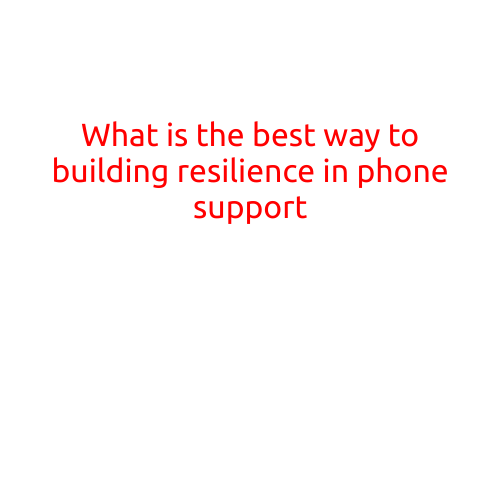
What is the Best Way to Building Resilience in Phone Support?
As a phone support agent, dealing with frustrated customers, resolving complex issues, and handling high-pressure situations can be emotionally draining. Burnout and exhaustion are common pitfalls in this demanding role. However, building resilience is crucial to perform job duties effectively, maintain quality performance, and ensure customer satisfaction.
So, what is the best way to build resilience in phone support? In this article, we will explore the essential strategies, techniques, and best practices to help you develop the skills and mindset necessary to overcome the challenges of phone support.
Understand and Manage Stress
Stress is an inevitable part of phone support work. Understanding the sources of stress and developing coping mechanisms is vital to building resilience. Identifying stressors, such as heavy call volume, difficult customers, or tight deadlines, helps you prepare and respond to them more effectively.
Develop Emotional Intelligence
Emotional intelligence (EI) is the ability to recognize and manage your emotions, as well as empathize with others. Developing EI helps you:
- Better understand customer emotions and respond accordingly
- Manage your own emotions and reduce stress
- Build stronger relationships with colleagues and customers
Role-Play and Practice
Role-playing and practicing various phone support scenarios can help you build confidence, improve communication skills, and refine problem-solving strategies. This training also allows you to rehearse handling difficult conversations and respond appropriately.
Mindfulness and Self-Care
Practicing mindfulness and self-care techniques, such as meditation, deep breathing, or yoga, can help reduce stress and maintain focus. Regular exercise, healthy eating, and sufficient sleep are also essential for overall well-being.
Support Network
Building a support network of colleagues, friends, or family members can provide emotional support, advice, and encouragement. Nurturing these relationships helps you feel less isolated and more resilient in the face of challenges.
Learn from Feedback
Receiving constructive feedback from customers, supervisors, or colleagues can help you identify areas for improvement and develop strategies for overcoming obstacles. Applying this feedback to your work helps you grow professionally and build confidence.
Positive Self-Talk and Reflection
Practicing positive self-talk and reflective journaling can help you develop a growth mindset, focus on successes, and learn from failures. This mindset shift helps you remain motivated, resilient, and committed to your role.
Debrief and Review
Regular debriefing and reviewing high-pressure calls can help you identify patterns, learn from mistakes, and refine your approach. This process also allows you to reflect on your performance, celebrate successes, and adjust your strategies accordingly.
Conclusion
Building resilience in phone support requires a combination of stress management, emotional intelligence, role-playing, mindfulness, self-care, support networks, feedback, positive self-talk, and reflection. By implementing these strategies, you can develop the skills and mindset necessary to overcome the challenges of phone support, maintain performance quality, and ensure exceptional customer experiences.
Remember, building resilience is a continuous process that requires effort, dedication, and a commitment to growth. By investing time and energy into developing these skills, you can thrive in the demands of phone support and achieve long-term success.





